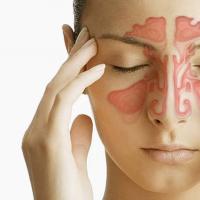How can a mother of a baby determine that the baby has a cold? The main signs of the disease. Methods of treatment. Rules for caring for a sick child up to a year
The health of the baby causes concern among parents. The most difficult thing is to protect a child from a cold: it is easy to infect him, he recovers hard, and complications often appear. It is important to know about the signs, the course of the disease, how to treat a cold in a baby, in order to help him in a timely manner.
Features of occurrence in children
In medicine, a cold is called ARVI or ARI (acute respiratory viral infection or acute respiratory disease). The first spreads during viral epidemics: the baby can become infected from relatives if his immune system is weakened.
ARI often occurs due to hypothermia of the baby, which causes a weakening of local immunity on the mucous membranes and the active reproduction of bacteria, viruses that are constantly present in humans in small quantities.
They try not to take babies under one year old to public places to prevent infection. If a close relative falls ill, communication is limited so as not to infect the child.
The baby is less likely to get sick due to the immunity received from the mother at birth. It acts in a newborn child up to 3-4 months, then the body independently forms a protective system and additionally receives antibodies from mother's milk if the baby is on. IV children are more likely to become infected.
mother's infection

Great difficulties are caused by the disease of a nursing mother, which can infect the baby. An infected person does not immediately learn about the disease: the first signs of a cold appear a few days after infection.
The virus from the mother can enter the baby’s body through the nasopharyngeal mucosa, breast milk, but you can’t stop feeding: the baby will lose the main medicine.
Frequent hand washing with soap and a gauze mask that needs to be changed several times a day will help limit exposure to pathogens.
Symptoms

The child is not yet able to explain that he began to get sick, so parents often pay attention to the obvious signs of a cold in a baby:
- Discharge of mucus from the nose;
- The eyes become cloudy;
- Difficulty breathing, the baby often opens his mouth or nipple during feeding, cries and refuses to eat, although he is clearly hungry;
- , may be accompanied by a feverish state, chills - the baby is trembling at normal room temperature;
- The voice becomes hoarse;
- There is frequent sneezing and coughing.
Prior to these symptoms, changes in the child's behavior should alert. He becomes lethargic or overly excitable. A baby does not sleep well, on the contrary, sleeps often and for a long time, is naughty. Signs of a cold in a newborn are a reason to immediately consult a doctor.
Cough and runny nose can be the cause of an allergic reaction or an individual feature of the course of the disease. Such symptoms of a cold in infants require clarification of the causes and treatment. Infants do not know how to blow their nose, cough, mucus from the nose flows down the throat, into the ear passages. May occur. A more serious complication is inflammation of the brain.
In infants older than 6 months, a runny nose and fever appear. How to understand that they began to grow? However, in children:
- rises;
- There is a desire to pull fingers and objects into the mouth, try to chew them;
- The gum at the site of the appearance of the tooth swells, turns red.
And with such symptoms, you need to consult a pediatrician: he will give recommendations on how to help the child with teething.
Methods of treatment

If a baby has a cold, Komarovsky recommends an immediate visit to the doctor. Only he will correctly decide how to treat a cold. It is advisable to use fewer different medicines, self-treatment of a cold in a baby is strictly prohibited. Medicines that help adults with similar symptoms may be dangerous for him.
With a viral occurrence of a cold, it is useless to use antibiotics, which are used for complications of an inflammatory nature.
When a pediatrician can prescribe nasal drops, vasoconstrictor or therapeutic based on saline, with inflammation - containing antibiotics. You can bury two or three drops in each nostril. It thins mucus, has an antiseptic effect. To facilitate breathing, you need to clean the nose with a pear, a nasal aspirator, in extreme cases - with your mouth.
Babies cannot swallow pills. For the treatment of a viral disease, suppositories for colds with content are prescribed, which are introduced into the anus. The drug is absorbed in the intestines, acts faster and does not harm the child's digestion. You can replace suppositories with drops or syrup, but they can cause vomiting.
There are positive reviews about the use of Anaferon for colds in infants. But it belongs to homeopathic preparations, for the treatment of a viral disease, funds with a higher concentration of the active substance are needed.
Contraindicated for the treatment of colds in infants:
- Decoctions, tea with honey, raspberries, cough syrups - can cause allergies;
- . It is not originally intended for the treatment of the common cold, promotes the growth of bacteria, accelerates inflammation;
- Rubbing with essential oils - can cause rashes and itching;
- Steam inhalations lead to burns of the nasopharyngeal mucosa;
- The use of mustard plasters is unacceptable for the baby's skin;
- Enema without the consent of the doctor.
Folk remedies are effective for colds, but it is not recommended to use them to treat a newborn. Medical procedures are prescribed by a doctor, self-medication can lead to complications that are life-threatening for the child.
If the child has a fever

The temperature in a baby up to 38 ° contributes to the production of antiviral substances by the body, it should not be knocked down. If you lower it already at 37 °, the baby will recover longer. At a temperature above 38 ° in children under 3 months, or 38.5 ° at an older age - urgently call an ambulance, it is better to give medicines under the supervision of a physician, since an allergic reaction is possible.
An ambulance does not always arrive quickly, and a rise in temperature threatens the child's life. In such a situation, you can independently give him an antipyretic agent intended for infancy.
In the absence of children's medicines in emergency cases, you can use paracetamol, which will quickly reduce the temperature. Previously, it was often prescribed in the treatment of children under one year old, but today its toxic effects on the kidneys and liver have been proven.
It is contraindicated if the baby is 1 month old or less. For a child aged 2 months or more, the single use dose is 15 mg per 1 kg of weight, not more than 60 mg per kg of body weight per day. The action starts in 30 minutes. and lasts 4 hours. Tablets should be dissolved in water and given to the baby to drink. You can not use more than 3 days, it is better to replace paracetamol with antipyretic drugs adapted for infants.
It is forbidden to give aspirin, wipe the baby with a solution of water with vinegar, alcohol, vodka. Chemicals enter the child's body through the skin, causing poisoning. A monthly baby can get a mucosal burn when inhaling vapors.
Thermoregulation in the body has not yet been established, sudden changes are dangerous and can cause convulsions in a child. To alleviate the condition, wiping with a cloth dipped in warm water is allowed.
The state of white fever is dangerous, which is manifested by high fever and pallor of the skin, while the limbs are cold. You need to bring down the temperature slowly, only under the supervision of a doctor.
Care rules

Komarovsky notes that the body is able to cope with a cold on its own, if favorable conditions are created. Basic Rules:
- Regular ventilation. The influx of fresh air allows you to get rid of viruses and bacteria in the room, oxygen makes it easier for the baby to breathe;
- The humidity level is within 70%. Dry air irritates the respiratory tract. You can use a humidifier, put a container of water near the battery, hang a damp cloth;
- The temperature in the room should not be higher than 22°. No need to additionally turn on heating devices, wrap the child, cover warmer than usual. A weakened body will be forced to spend energy on fighting overheating, to get sick longer;
- In the room, carry out wet cleaning 1 - 2 times a day, because microbes settle on the surfaces, and dusty air irritates the baby's mucous membranes, making it difficult to breathe;
- Clothing should be light and comfortable, made of breathable materials (cotton). Change the child's clothes immediately after he sweats, wiping him dry. Wet bedding should also be changed. For the duration of the illness, it is better to abandon diapers - they contribute to overheating at high temperatures;
- The child's head should be above the body, you can put a small pillow and monitor the posture of the baby when he is in the arms of his parents;
- Peace of mind in the home is important. You can not be angry with the child that he is sick and naughty. The baby feels stress, begins to worry. Double stress exacerbates the symptoms of the disease in infants.
Daily routine and feeding with a cold

Painful condition leads to exhaustion, fatigue. It is necessary to move away from the usual sleep pattern and give the child more sleep to restore strength. It is necessary to avoid noise, bright light, active games - a sick baby quickly gets tired and needs rest.
With a small cold, you should not give up daily walks if the child can breathe through his nose. They must be of short duration. Contraindication is high fever, severe runny nose, cough, tonsillitis, weakness.
Nutrition is necessary for the baby to recover, contains useful substances and vitamins. If nasal breathing is impossible, the newborn often refuses to eat, with an exacerbation of the disease and high fever, there may be vomiting. You can not force the child to eat, it is better to feed more often, but reduce the portion.
If the baby’s diet has already begun to be introduced, you need to abandon new products for the duration of the illness. When appetite appears, you need to give those cereals or mashed potatoes that are well digested by his body.
The baby needs to be supplemented with boiled water, even if he is breastfed. Increased sweating causes dehydration, you need to restore the water-salt balance.
Bathing and massage

It is believed that you should not wash children with a cold. A contraindication is a strong fever and poor health. You should refrain from the procedure if the temperature subsided less than 2 days ago. In other cases, water procedures are mandatory: they allow you to cleanse the skin of toxins that leave the body with sweat, and allow the skin to breathe. The temperature should be a couple of degrees higher than usual - 37-38 °. It is possible to return to the usual temperature after the complete recovery of the child.
Is it possible to bathe a baby with a cold, the attending physician decides. Pediatricians prohibit the procedure due to the risk of hypothermia. You can wipe it daily with a soft cloth dipped in warm water. It is necessary to alternately wipe and dry all parts of the body with a towel. If you wet the baby completely, he may freeze.
The doctor may prescribe baths with. It may be having an antibacterial effect. prescribed to facilitate the breathing of the baby. You should not bathe with a decoction without a doctor's prescription, or use new plants, the reaction to which the baby is unknown.
Is it possible to massage with a cold? At the beginning and active phase of the disease, the procedure should be abandoned. It leads to vasodilation, a slight increase in body temperature, which is dangerous if the baby has a fever. A viral disease causes headaches, which are exacerbated by increased pressure during massage. Exposure to the chest leads to increased sputum production. It prevents the baby from breathing, and he still does not know how to cough properly. It is better to cure a cold in an infant, then resume the course of massage.
A cold in an infant lasts from 4 days to a week. At the first signs of the disease, you need to consult a doctor, follow his instructions in the treatment. This will allow him to recover faster and avoid complications.



